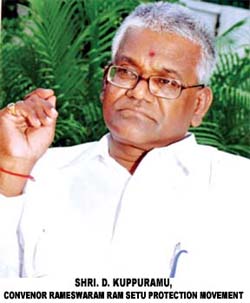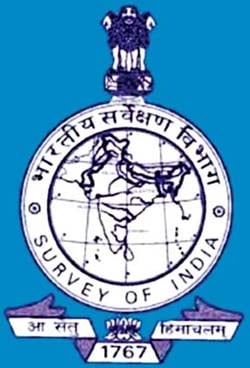By : V. Sundaram

Chennai : Rameswaram Ram Setu Protection Movement (RRSPM) organized an International Seminar on scientific and security aspects of Setu Samudram Channel Project (SSCP) on 12 May, 2007 at Mylapore in Chennai. D Kuppuramu, Advocate and Convenor, Rameswaram Ram Setu Protection Movement (RRSPM) presided over the Seminar. Dr S R Rao, founder of Society of Marine Archaeology in India, who was scheduled to inaugurate the Seminar, could not do so on account of his ill health.
The focus of the international seminar was on scientific and security aspects of Setusamudram Shipping Channel Project (SSCP), with participation by twelve experts. Together with this, we were taken into the mists of history, recounting the social, cultural and spiritual memory of a great hero Sri Rama celebrated in the great epic, Ramayana in many nations of the world.
The contributions made by many scientists and scholars having compiled in a book, titled, 'RAMA SETU' which includes the papers presented in the seminar held on 12 May, 2007 in three sections:
1. Scientific-economic aspects
2. Socio-cultural aspects
3. Security aspects.
SSCP which creates a channel passage in the Indian Ocean has serious security implications and disastrous impact on long-term ecological stability on the coastline of Tamilnadu and Kerala. The adverse impact of the project on the marine resources and on the lives of fisher folk of Tamil Nadu and Kerala who are heavily dependent upon the fishery and aquatic resources of Gulf of Mannar and Palk Bay, were highlighted by all the experts who spoke at the Seminar.
Serious lapses in project design of the deep-water channel linking Bay of Bengal and Indian Ocean, underscored were that 1) the impact of a tsunami, on national security has not been studied and 2) no tsunami protection measures have been incorporated in the project. Fisher folk in the Southern coastal districts of Tamilnadu are concerned that creating a de-facto international boundary by cutting a channel passage through Rama Setu, under pressure from the US Navy, will prevent the exercise of their historic rights in the Gulf of Mannar/Palk Bay. In this context, the deliberations in the Seminar also specially noted the concerns expressed by 34 Sri Lankan experts in their report to their Foreign Secretary in April 2007, in particular: 'The United Nations Law of the Sea mandates that neighboring States need to be consulted and sufficient safeguards and guarantees provided… Dredging will also reduce the photosynthetic rate, resulting in the collapse of the fishing industry… It is also salient that no maritime archaeology has been conducted on this site. Scientific evidence, in a paper presented by Prof. Senanayake, indicates that 13,000-years ago, the area around the Kalpitiya lagoon, up to Mannar, were forested. Even today, stumps of old trees are found underwater."
 http://newstodaynet.com/2007sud/may07/1205ss1.htm http://newstodaynet.com/2007sud/may07/1205ss1.htm
Related HJS Campaign |




